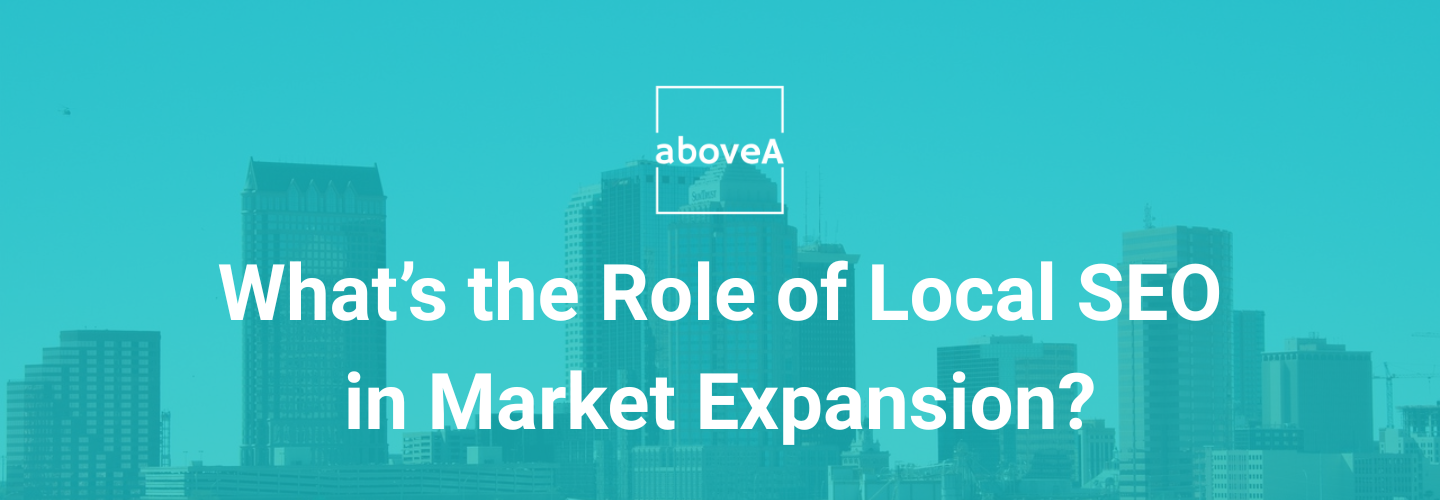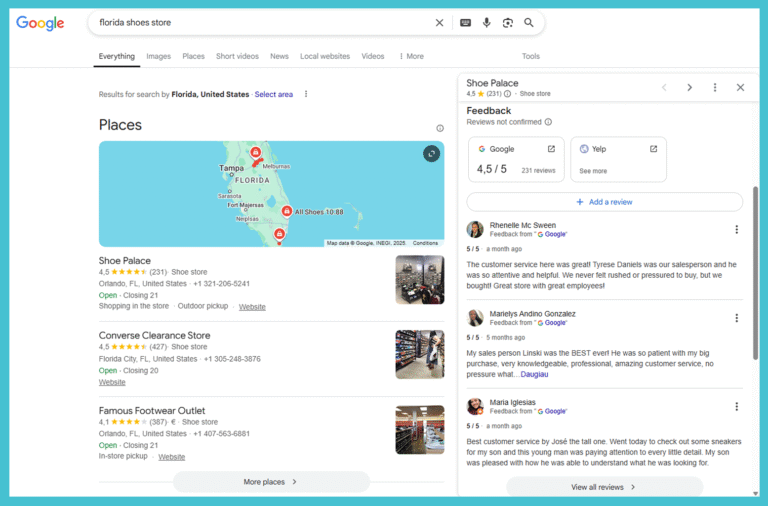
What’s the Role of Local SEO in Market Expansion?
Local SEO is a powerful tool if you seek market expansion. It helps get found by people who live near your new location. So to speak, when people search online in their familiar location, they can see your business first in the search results.
It doesn’t matter if you are opening a shop, offering services, or launching in a new place; local SEO puts you on the map, both literally and online. It brings in real leads, right from your target area, without needing a big advertising budget.
In this article, I will lead you towards a better understanding of how SEO works. Why local SEO matters for business growth, and the exact steps to take. On top of that, we will cover things like Google Business Profile, how to use location keywords, including managing reviews, and creating local pages. So, let’s dive in!
What Is Local SEO?
As said before, local SEO stands for building your digital online infrastructure, helping your business show up in online search results when people nearby are looking. It works with maps, directories, and search engines like Google. If someone types “pizza near me” or “shoe store in Dallas,” local SEO helps them see local businesses.
It uses things like:
- Your Google Business Profile
- Local keywords (like your city or neighborhood)
- Online reviews
- Location-based pages on your website
Local SEO is great for businesses with stores, offices, or who serve people in certain locations. So, no matter if your business is b2b or b2c, local SEO can be a great foundation to ensure your online growth.
Why Does It Matter for Expansion?
Local SEO helps your business grow in new places. When you enter a new market, people don’t know your name yet. They search for things like “pizza near me” or “best gym in town.” If your business doesn’t show up, they won’t find you.
In 2025, local SEO is even more important. More people use voice search, like asking, “Where’s the nearest nail salon?” Mobile searches are growing fast, too. People want answers quickly. While they’re on the go. Google also shows local businesses first on search pages. That means you need to be in those top spots.
Think about opening a new coffee shop. You can’t wait for customers to come by chance. You need to pop up in their search. Local SEO makes that happen. It builds trust fast, brings in real people nearby.
Often, many b2b businesses would question the use and purpose of local seo in their environment. However, despite the negative stand, the local SEO matters to them too. How’s it so? Let’s imagine your business sells office supplies, builds websites, or offers cleaning services. People who belong to your ideal customer profile based nearby may need what you offer, but they won’t know you unless you show up in search. They might search for “IT support in Dallas” or “local B2B marketing agency.” If you’re listed and easy to find, they’ll call you first. Many B2B deals start online now. Being on Google Maps, having reviews, and showing up in local searches helps you get those deals before your competition does.

Builds Local Trust and Visibility
Local SEO puts your business in local maps and listings. This helps people feel like you’re part of the community. That’s important when expanding. Apart from your branding storytelling, people are about to trust what feels familiar, location-wise. That said, if your store appears in search, on maps, and has good reviews, they’ll feel safer trying you out.
What Are the Key Tools?
To grow in a new location using local SEO, here are a few things you need:
1. Google Business Profile
This is a free tool from Google. You can add your business name, address, phone number, hours, website, and photos. When someone searches for your service in your area, your listing might show. Make sure everything is correct. If your address is wrong, you won’t show up, or you may face penalties.
2. Location Pages
If you serve more than one place, create a webpage URL for each city or area. For example:
- /chicago-shoe-store
- /atlanta-shoe-store
- /fl/

Each page should talk about what you offer in that city. Also, you need to optimize it with local keywords, fast loading speed, unique content, and clear contact info to shine. Add city-specific headings, customer reviews from that location. Don’t ditch using structured data so Google knows it’s a local page. This helps your page rank higher and attract real local traffic.
3. Online Directories
Online directories are websites where your business can be listed so more people can find you. These sites help you show up in local searches. Also, build trust with reviews, and even help with your Google rank. The key is keeping your Name, Address, and Phone number (NAP) the same across all of them. Even a small mistake can confuse search engines.
Here’s a helpful chart with popular directories and how to get the best results from each one:
Directory Name | What It’s Good For | Tips to Get the Most |
Google Business Profile | Shows up in Google Search & Maps | Fill in every field, add photos, respond to reviews. |
Yelp | Local reviews and business visibility | Ask happy customers to leave reviews, update info often. |
TripAdvisor | Travel, food, and tourism businesses | Post menus, photos, and respond to visitor questions. |
Facebook Business Page | Connects with locals through Facebook search | Post often, share updates, keep hours correct. |
Local Chamber Website | Builds trust, especially for B2B | Join your Chamber, list services, and link to your site. |
Apple Maps | For iPhone users searching nearby | Claim your business through Apple Maps Connect and keep info accurate. |
Bing Places | Helps reach Bing users and local searchers | Sync details with your Google profile, upload photos. |
Foursquare | Location-based discovery tool | Add business hours, menu, and promotions. |
Yellow Pages (YP.com) | Online version of traditional phone listings | Add keywords to your profile, keep info updated. |
Better Business Bureau | Builds trust for B2B and service businesses | Get accredited if possible, reply to feedback professionally. |
Hotfrog | Small business directory useful for niche services | Fill out complete details, include industry-related tags. |
Alignable | Local networking and referrals for B2B companies | Join groups, share updates, and ask for recommendations. |
Directories like these can help both customers and search engines trust you. Use several, not just one. Update them every few months and check that your info is always the same. Doing this can help bring more clicks, calls, and customers right to you.
Using the Right Keywords
To show up in local searches, you need to use the words people type. These are called local keywords.
Instead of just saying, “We sell running shoes.” Try saying: “We sell running shoes in Austin, Texas.”
Use local phrases people search for, like:
- “Best hair salon in Phoenix”
- “cheap dentist near me”
- “Marketing services in Dallas, Texas”
Put these words in your titles, web pages, image names, and page descriptions. But be careful not to use them too much. That can hurt your rank.
The Power of Reviews
Good reviews can boost your local SEO. People like to read reviews before they visit a new business. Google uses reviews to decide which places are popular. So, after you serve a happy customer, ask them to leave a review. Even a short one helps. If you get a bad review, don’t panic. Reply nicely and try to fix the problem. That shows others you care.

Mobile Optimization Matters
Most local searches happen on phones nowadays. People search while walking, driving, or sitting in a café. They want quick answers, and they want them now. If your website doesn’t work well on mobile, users might leave quickly. That’s bad for your SEO. If they bounce away quickly, Google sees your site as less helpful, which lowers your rank.
To get the best results, make sure your site is mobile optimized, which includes aspects such as:
- Your mobile version loads quickly because users won’t wait for slow pages.
- Your site should look great on a phone or tablet, not just a computer. Make sure your website elements are well distributed and are of accurate and attractive proportions.
- Your mobile website’s version has buttons large enough to tap, so no one struggles.
- Phone number is clear. Customers should be able to call you without searching for your number.
Use Local Content
Local stories, events, or news can make your website feel more connected to the area. This is especially important for both B2B and B2C businesses. By focusing on topics relevant to your town or city, you show customers and other businesses you are a part of their community.
Let’s say you opened a gym in Seattle. You could write blog posts like:
- “5 Hiking Trails Near Seattle for Beginners”
- “Our Favorite Healthy Restaurants in Seattle”
- “Grand Opening of Our Seattle Gym – Join Us!”
- “How Local Businesses Can Support Each Other in Seattle”
- “Top Networking Events for Seattle’s Tech Industry”
- “How Seattle Startups Can Benefit from Local Marketing”
Localization optimzied posts help people feel like you’re not just a business in their local area. It will also bring more traffic to your site. Additionally, when you talk about local events, people will want to share them, which increases your visibility. Hence, keep these posts fresh. Don’t forget to include local keywords related to a specific location to boost your SEO even further.
Track Your Results
As usual, to determine whether your chosen means and tactics work, you gonna need to track them. For that, you will have to employ tools that help you see where your visitors come from, what they’re looking for, and how they find your business. Some key traditional tools which you should consider are:
- Google Analytics. This tool shows where your visitors come from. You can see if people are finding your site through Google searches, social media, or other websites.
- Google Search Console. This application will help you track which keywords bring visitors to your site. It also shows how often your pages appear in Google searches and how many clicks you get.
- Google Business Profile Insights. This Google tool will show you useful details like how many people called your business, asked for directions, or viewed your profile. It helps you understand if your Google listing is working well.
These tools help you see what’s working and what needs fixing, and adapt where and when needed. By checking them regularly, you can make smart decisions on how to improve your SEO and attract more local customers. Also, outperform your competition both in your area and later beyond.
Local SEO for Service-Based Businesses
Even if you don’t have a shop, local SEO still helps. Let’s say you fix air conditioners or walk dogs. You can still show up in local searches if you list your service areas and keep your info updated.
Use words like:
- “Plumber serving Chicago’s West Side”
- “Dog walking in Queens and Brooklyn”
Basically, this tells search engines where you work, even if your office isn’t in every spot.
Expanding to Multiple Locations? Use This Tip
If your business is growing into many cities or regions, it’s important to set up separate pages for each one. This helps you rank better in every location. However, don’t just copy and paste the same text on each page. Because it won’t work this way. Each page should be unique to its city or region. Here’s what I usually take into account when trying to use local SEO:
- Mention the location or area the business is serving, so Google knows where the business is located.
- Provide value-driven explanation of what the business offers in that specific location. Maybe have different services or products depending on the region.
- Show reviews from customers in that city. This helps build trust with locals.
- Upload images of the particular business, staff, or local landmarks in that area. It makes the page feel more personal, real. Plus, I have noticed it can bring a lot of trust if the business is especially young.
By making each location’s page unique, you’ll have a better chance of ranking in each place. It helps Google see that you’re relevant to each city and gives you more visibility in local searches. Plus, customers are more likely to trust a business that shows they’re focused on their area.
Final Thoughts
Local SEO helps your business grow in the places where people live, search, and shop. If you’re expanding into a new area, don’t wait. Start building your local SEO early. Localized SEO can help people find your business. It has a great influence on building trust. It also acts as a useful tool to generate leads without ads. And best of all, it makes your business feel local, even if it just arrived.
That said, if you want more foot traffic, calls, and sales from your new market? Make local SEO your best friend.
Team aboveA Will Take Care Of Your Market Expansion!
Meet the Author

Faustas Norvaisa
A Growth & Product Expert with 9 years of experience in revenue diversification, international expansion, SEO, and digital marketing. Passionate about scaling businesses and building global brands, he empowers companies to thrive with his motto, "sharing is caring.

